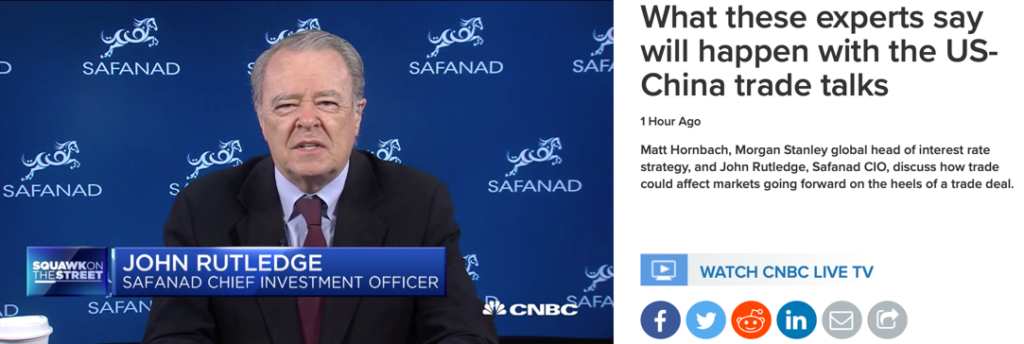Summary: This morning I got to talk with Squawk anchors Morgan, David, and Carl about today’s announcement that there will be no tariff hike next week. As I wrote earlier, I believe that a deal will be announced this week. Announcing a deal is easy; enforcing it is hard. But this is an important positive for global markets. You can see the interview by clicking on this link.

As you know, I send talking points to the producers before every show so the anchors know w hat is likely to come out of my mouth. I have copied today’s point below, typos and all.
Rutledge talking points
- I believe there will be a trade deal this week. March 1 deadline will go away.
- I gave a private briefing to the Cabinet, including the whole trade team, in the White House a few weeks ago.
- Briefed them on the China economy—very weak.
- Cause of weakness is not the tariffs.
- Slowdown caused by a severe credit crunch for the private companies that account for 70% of jobs.
- Credit crunch caused by the collapse of shadow banking industry and peer-to-peer lending.
- Slowdown has spread to Japan, Taiwan, S. Korea, and Germany due to linked supply chains.
- I believe both sides ready to make a deal.
- Elements of a deal that would work include:
- China agrees to buy a bunch of US stuff (soybeans, steel, …..) This is easy to do.
- We both agree to take down the tariffs.
- China agrees to step up IP protection efforts
- They already have a new law going into effect.
- They already have imposed stiffer penalties for stealing technology
- There is major pressure in China to protect THEIR IP as well. (Think Alibaba)
- The big issue? Huawei/ZTE/G5. Thats where we need real dialog.
- You will never get them to stop subsidizing SOEs.
- They will never agree to reverse their ‘industrial policy’. It is the key to their going from a low-margin assembler of our products to a producer of their own high-value products.
- US arguments over manipulating their currency make no sense at all. The RMB is still not convertible, i.e., Chinese citizens are still not freely allowed to own foreign assets including dollars.
- They have been propping the RMB up, not pushing it down. Chinese leaders are deathly afraid of capital outflows. They would welcome a joint statement about stable currency values because it would discourage investors from pulling capital out.
- I believe the final deal will look a lot like the above
JR








